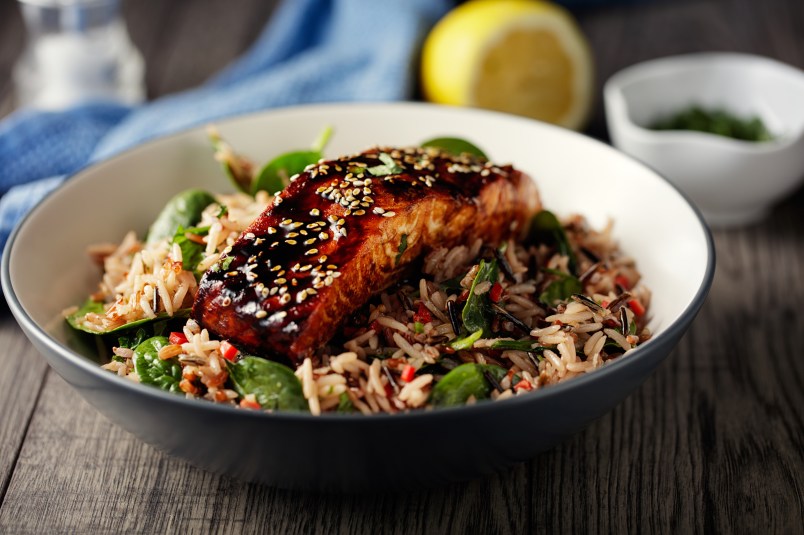Lose 10 Pounds in One Week With Dr. Oz’s Easy Twist on the Mediterranean Diet

If you’re looking for a slimming, low-stress way to get your health back on track, Dr. Oz’s new System 21 plan has a lot going for it. He’s upgraded his signature “time-restricted eating” approach — which really just means trading breakfast for brunch — with a tasty Mediterranean twist. And women tell us the strategy allows them to eat delicious food while dropping five, 10, even 14 pounds a week. On top of that, they feel amazing: fewer aches and pains, happier moods, sounder sleep. They’re even reversing diseases, getting off meds, and building ultra-immunity. “System 21 is a health plan for your entire body and mind,” the doc recently told his fans. “We can give ourselves the fresh start we deserve!”
Dr. Oz has become a passionate advocate of the popular “intermittent fasting” trend, favoring an easy-does-it version that simply keeps all meals and snacks between about 10am and 6pm. His reasoning? “You derive benefits if you cut down on the number of hours you eat each day. Our bodies aren’t designed to be eating every waking minute,” he explained.
Turns out, shrinking our daily eating window triggers biochemical changes that developed to help humans survive and thrive when food was scarce. Research links these changes to improvements in blood sugar, blood pressure, cholesterol, emotional well-being, and more. It also prompts the body to burn a lot more fat for fuel — so much so that a new study from London’s Queen Mary University found Oz-style intermittent fasting leads to significant weight loss even if used only five days a week!
How does the System 21 diet plan work?
After perimenopause caused Jana Howard to pack on pounds, she spent more than a decade yo-yo dieting. “I was 58, and my doctor was talking about putting me on blood-pressure and cholesterol meds,” recalls the Alabama mom. “I didn’t want that.”
So when she heard about time-restricted eating from Dr. Oz, she decided to try it. “I knew Mediterranean foods were good for me, so that’s what I ate.” Jana’s go-to meal: salad with beans, veggies, and protein. Eating from noon until 8pm, she’d shed 65 pounds when pandemic stress led to a heart attack. “It was scary, but the recovery was quick because I’d turned my health around.” Now down 74 pounds, Jana, 59, feels effortlessly healthy. “I don’t even have to think about it. I just eat during my eight-hour window!”
So what made the doc pair the technique with Mediterranean staples like salmon, greens, beans, whole grains, olive oil, and wine? “New science says that a Mediterranean diet can boost the benefits of intermittent fasting even more,” Dr. Oz shared.
What’s the science behind it?
Not long ago, a University of Minnesota team wrapped up eight years of tests to determine why the Mediterranean diet makes people so healthy. They discovered not one, but two surprising things. First, the diet’s success can be largely attributed to its high content of olive oil and other good fat. Second, the fat’s main superpower — its ability to turn on a gene linked to robust health and effortless weight control — is only activated by exercise or intermittent fasting. Lead researcher Doug Mashek, PhD, notes that fat is temporarily stored as microscopic droplets in our cells as a form of fuel. “When the fat is broken down during fasting is when the beneficial effects are realized,” according to Dr. Mashek.
And here’s what really swayed Dr. Oz, a cardiac surgeon: “The research says that a Mediterranean diet rich in omega-3 fatty acids combined with intermittent fasting can lower the risk of heart disease more than any other diet that we know of.”
It’s also worth noting that studies show good fats naturally reduce appetite, helping Mediterranean dieters lose 300 percent more weight than traditional dieters. To get a just-right amount of these fats, aim for two tablespoons of olive oil daily plus three weekly servings of omega-3 rich fish (such as low-mercury light tuna, tilapia, salmon, and sardines). On days when you don’t eat fish, consider a fish oil supplement with 600 to 1,000 milligrams of DHA fatty acid. Always get your doctor’s okay to take a new supplement.
How did this diet work for others?
As a nurse, Cheryl Gremban knew she was heading for heart disease — her waist was over 40 inches, and her blood pressure and triglycerides were too high. “I’d tried multiple diets, but success was short-lived,” recalls the donut-loving California grandmother, 64.
A co-worker suggested intermittent fasting. “I Googled it and the science was convincing,” recalls Cheryl. So she got started, aiming to eat heart-healthy Mediterranean fare in an eight-hour window. “I will admit, I watched the clock at first,” she recalls. Luckily, she happened upon the site GinStephens.com and read that skipping zero-calorie sweeteners while fasting could help. “After that, my hunger was totally controlled.”
As pounds disappeared, so did her cravings. “I used to crave sugar almost nonstop. I remember being surprised when I started craving salad instead,” recalls Cheryl, who wrote a book about her experience called The Health Experiment. All told, she shrank from a size 14 to a size four. Her doctor gives her an A+ for improved heart health — and her severe carpal tunnel pain disappeared too. “Decide what feels manageable to you and just start,” she says. “Give it 30 days and see how it works for you. I bet you won’t ever go back!”
This article originally appeared in our print magazine.












